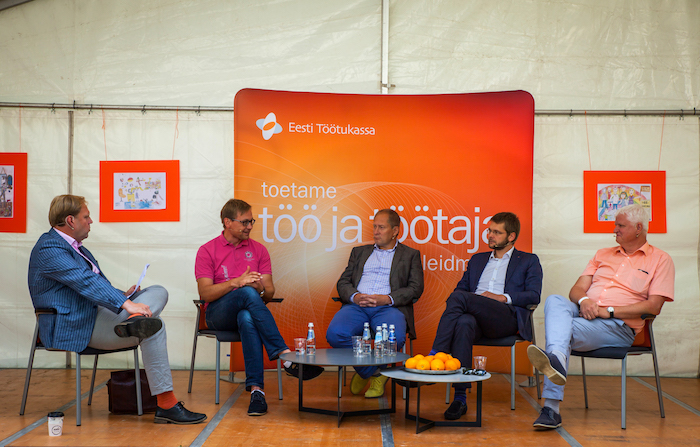
Photo: Anna Markova
Robots are advancing and they are hungry for our jobs. While the narrative of man vs. machine is centuries-old, the advent of artificial intelligence has made it trendy to talk about work again and picture how it will look in the future — or if work will exist at all.
Little surprise, then, that one of the first discussions of this year’s Opinion Festival, exploring attitudes towards employment in Estonia, would attract a huge crowd. The discussion, moderated by Urmas Vaino, saw a panel of four explore a wide spectrum of issues related to work now and in the future, youth unemployment, responsibility, automatisation, and rural development as intrinsically tied up with employment.
As much as the daily drudgery (or joy) of work can feel like a constant, the way we work and think about work is ever evolving. This inevitability of change was acknowledged straight away, with the panelists offering their take on the biggest change in employment over the last thirty years. Needless to say, this has been a period of phenomenal change in Estonia as the country went from communism to full-blown capitalism following the restoration of independence. According to Toomas Tansar, head of the Estonian Employers’ Confederation, work used to be perceived as something singular, something everyone had to do no matter what. Attitudes towards work are now far more diverse, with more and more people deciding just how and how much they want to work. But with more flexibility comes more responsibility.
One train of thought running through the whole discussion is the need to prepare society and individuals for the changing landscape of work. Jevgeni Ossinovski, Estonia’s Minister of Health and Labour, argued that change is neither good nor bad, but boils down to society’s level of preparation. The introduction of self-service machines to supermarkets, for example, is part of the process of automatisation, and can ultimately free up citizens to do more creative, more fulfilling jobs. “A person’s work life ought to be fruitful and offer satisfaction to those who work,” suggested Ossinovski.
For Peep Peterson, who represents trade unions, this responsibility to prepare and reconsider is not merely societal but personal. It is “essential to rewire yourself” and be agile. However, Peterson stressed that the choice where and how to work remains a privilege for certain fractions of society. On the flip side of privilege is what Meelis Paavel, manager of Eesti Töötukassa, suggests is a more “fun”-centric approach to work, particularly among younger people entering the workforce. Paavel has increasingly encountered the attitude whereby “work should not interfere with life”, that is, workers desire less dependability on their employers and crave more freedom.
This desire for freedom and flexibility sits uneasily with Estonia’s youth unemployment: currently 39,000 young people neither work nor study. Low-paid jobs remain vacant while, as Ossinovski pointed out, the interest to work even summer jobs is on the wane. If the education system does not ramp up entrepreneurial education or vocational learning that does not ignore the looming spectre of automation, it is not nurturing the employees future economic models will desperately need. This situation intensifies in rural areas where opportunities are more sparse. Toomas Tansar argued that rather than forcing industry and vocations to rural areas, rethinking workforce mobility to urban hubs could be the solution.
Tansar also urged a poignant word of caution when acting on the changing face of work, either as state or employer. The transition to a smart, knowledge-based economic system cannot simply be willed into existence: “Let’s just do away with easy jobs and then somehow, more of those smart jobs will follow. But where will they come from?” This question, in essence global, needs to co-exist with more local and transient considerations, such as battling unemployment in former industrial powerhouses such as Ida-Virumaa or youth demotivation.
